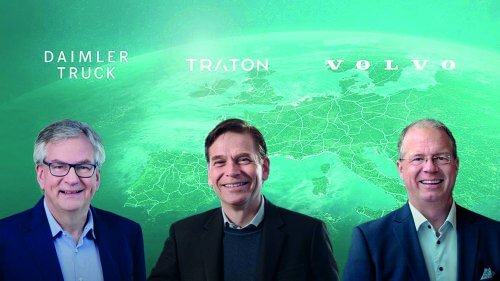Three of the major European players are set to work together to improve access to charging facilities for commercial electric vehicles
Commercial vehicle manufacturers Daimler Truck, the Traton Group and Volvo Group have signed a binding agreement to create a joint venture, subject to regulatory approval, to install and operate a high-performance public charging network for battery electric, heavy-duty long-haul trucks and coaches across Europe. The parties have committed to initiating and accelerating the necessary build-up of charging infrastructure for the increasing number of customers of electric vehicles in Europe and to contribute to a goal of climate-neutral transportation in Europe by 2050.
The planned joint venture, which will be equally owned by the three parties, is scheduled to start operations this year following completion of all regulatory approval processes. The parties have together committed to invest €500 million, which is believed to be largest charging infrastructure investment in the European heavy-duty truck industry to date. The plan is to install and operate at least 1,700 high-performance green energy charging points on and close to motorways as well as at logistics and destination points within five years. The number of charging points is intended to be increased over time by seeking additional partners as well as public funding. The future venture is planned to operate under its own corporate identity and be based in Amsterdam. It will be able to build on the broad experience and knowledge of its heavy-duty trucking founding partners.
CEO of Daimler Truck Martin Daum said: “Today’s signing announcement is great news for the transport industry and society, as it underlines all of the partners’ strong commitment to making CO2-neutral trucks a reality. It is remarkable that three fierce competitors are taking action together to start establishing the needed charging infrastructure. Together with Volvo Group and the Traton Group, we want to send a clear signal to all relevant stakeholders to follow our lead and act now.”
Christian Levin, CEO of the Traton Group, commented: “We have the strong opinion that we as the Traton Group together with our brands Scania and MAN as well as the commercial vehicle industry as a whole will be part of the solution when it comes to a CO2-neutral world. A collaboration with strong competitors like Daimler Truck and Volvo Group might seem unusual. However, the topic is of crucial importance and this unique cooperation will make us faster and more successful in delivering the transformational action needed to tackle climate change. Our joint venture will be a strong push for the rapid breakthrough of battery electric trucks and coaches, the most efficient and sustainable transport solutions.”
Martin Lundstedt, President and CEO of Volvo Group, added: “We are going from words to action, and this planned joint venture with Daimler Truck and the Traton Group is an important step in shaping a world we want to live in. Innovative partnerships like these will enable the much-needed change that will benefit our customers and the entire industry. This is both a historical milestone in the transformation towards fossil-free transport and a breakthrough that shows Volvo Group’s commitment to reaching net-zero greenhouse gas emissions by 2040 and a net-zero emissions rolling fleet by 2050 at the latest.”
The three partners see this as a breakthrough for the transport industry to cut carbon emissions — and for other industries to benefit in several ways. A recent industry report called for up to 15,000 high-performance public and destination charging points by no later than 2025, and up to 50,000 high-performance charging points by no later than 2030. The partners said that this kick-start is a call for action to all other industry players, as well as governments and policy makers, to work together for a rapid expansion of the necessary charging network to be able to contribute to reaching the climate targets. As a clear signal towards all stakeholders, the charging network of the three parties will be open and accessible to all commercial vehicles in Europe, regardless of brand.


